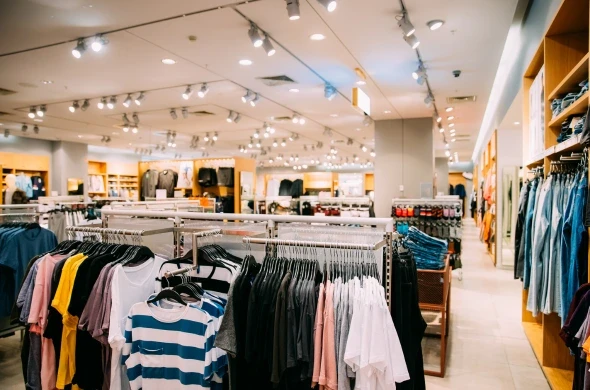What do you think of when you imagine retail real estate? Probably a high-end store in a shopping center with racks of items for someone to purchase where someone can look at physical items, hold a product in their hand, buy it with their card, and walk out of the store with their items. The metaverse is changing that.
In a world where people can buy anything from food, clothes, and autos online, now there is a shift towards retail real estate in a world that doesn’t even exist.
We’re going to explain one way you can drive retail sales for your brand, and you don’t even need a physical store location at all.
What is the metaverse?
The metaverse is an immersive world, fueled by virtual reality, where people can go to interact with others as digital avatars.
Even though the metaverse started out as something for entertainment, digital retailers are taking notice and making money off the metaverse.
What is a digital plot of land in the metaverse?
It’s land that is located completely online in an immersive world. For example, you’re traveling to a destination in Dubai that exists in a virtual reality world rather than the physical world. Your avatar comes across a storefront for perfumes. Even though it’s a digital representation in a fictitious world, someone bought that store with real-world money. Your avatar can walk in the door, look at products on the shelves, and make a purchase with that retail store, even though your product is virtual.
That’s why digital plots of land are valuable. Much like advertising on social media that gets your company noticed, buying a digital plot of land in the metaverse can help people notice your brand in a unique way.
How do you set up a retail location in the metaverse?
First, you'll need a digital wallet. If you have an e-commerce retail store, a digital wallet allows you to accept digital payments from anyone who has the type of payment method you accept.
In the metaverse, these digital wallets may act exactly like they do for e-commerce sites through secure channels.
Next, you’ll need to purchase land in a metaverse. We’ll explain that in a moment. Digital stores began before the metaverse. We’re going back to 2018 when Storefront and Obsess worked together to build the world’s first virtual pop-up store. Customers interacted digitally with the store to make purchases. But it wasn’t a traditional e-commerce model. People’s avatars walked up to a store, looked at purchases, and spent money.
As virtual reality begins to have a wider influence on the world’s society, particularly following the COVID-19 pandemic, more and more digital commercial real estate transactions are happening. The physical world is missing out.
Why are brands pumping real money into virtual real estate?
Virtual real estate doesn’t exist except as pixels of visual information in a fictional world. Yet brands are pumping millions of dollars into a fledgling industry expected to be worth billions in value in a few years. Why? Cryptocurrency, blockchain, and NFTs.
Tech companies investing in NFTs are taking the lead in this digital revolution. Companies like Samsung and Sotheby’s have set up virtual stores in metaverses created by tech companies to foster NFTs. Adidas, Martha Stewart, and L’Oreal also have virtual stores.
These non-fungible tokens represent digital codes found nowhere else in any virtual world. They are unique. They are customized. And people can buy them using decentralized cryptocurrencies in a virtual world.
NFTs are digital representations of real-world objects. For example, in a video game you can purchase an outfit for your character. In the metaverse, your avatar buys an NFT for whatever you feel like you need in the metaverse, whether it’s food, clothes, a house, art, or furniture.
So, buying virtual items is great for people with lots of disposable income. It’s because people are willing to pay for the experience of interacting with their brands in a virtual setting. But buying land? How does that work?
How does land derive value if it exists virtually?
Just like in the real world. Plots of land are NFTs, or unique code, that puts a plot of land in prime locations in a virtual world. Larger retail locations are worth more money. Just like a physical location, the idea is to stand out from a crowd.
Metaverse Group spent $2.43 million to purchase land in Decentraland, the brainchild of a Japanese firm that runs on Ethereum, a popular cryptocurrency. Other retailers have followed suit and have set up shop in Decentraland, like Samsung, and as you would imagine there are plenty of opportunities for advertising.
There’s a reason why the Burj Khalifa is the most expensive plot of land in Dubai. It’s the biggest and most recognizable landmark in the entire city, and people flock to it every day.
Can virtual real estate be used for other purposes?
Absolutely. It can be used for advertising space, gathering space, concerts, and entertainment. The possibilities are endless.
The key is to have personalized and customized experiences with your target audience. The goal is to get those interactions to translate to the real world.
Because your target audience had a positive experience with your brand in the metaverse, they tend to think of your brand positively in the real world.
As such, your brand must be intentional with its choices in a metaverse. Give your customers what they want with a customized virtual product, whether it’s a decoration, pet, furniture, or jewelry.
You must also make it easy for people to interact with and buy your NFTs.
Because the metaverse runs on cryptocurrency, you need to make your virtual wallet easy to interact with.
Luckily, with cryptocurrency, there are no foreign exchange rates, or anything like to deal with. Everyone in the metaverse should already use some kind of cryptocurrency. But you’ll have to make it easy for your customer base to use it.
Technology Consulting Services | Retail Consulting Services | Consumer Goods Consulting
At Ollen Group, our technology and strategy consultancy services are up to date with consumer shifts in the Middle East, and the necessary steps needed to leverage next-generation technology to improve your retail experience for customers - including the development of different aspects to be part of the metaverse and cope with the demand for digital progression. Ollen Group technology consultancy services, retail consultancy services and consumer goods consultancy services offer turnkey solutions from strategy to execution, as well as design, development, and deployment.
Read our latest insights, ideas, and perspectives that explore the trends shaping the future of business and society. Our consultancy services go hand-in-hand with these insights, confirming our position as industry leaders. Get in touch to find out more about our consulting services and industry expertise.



